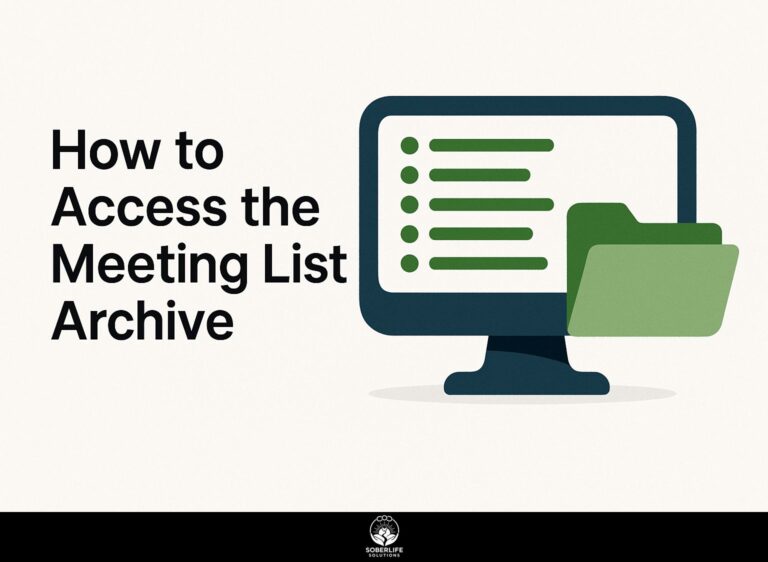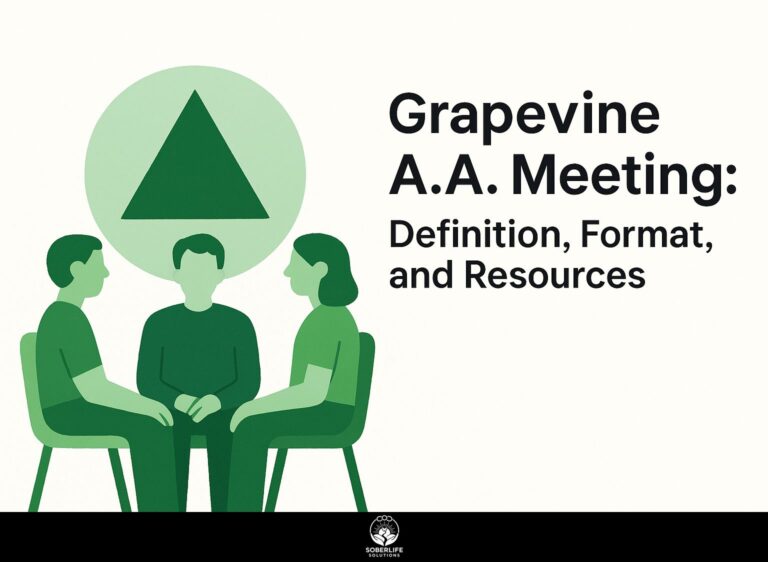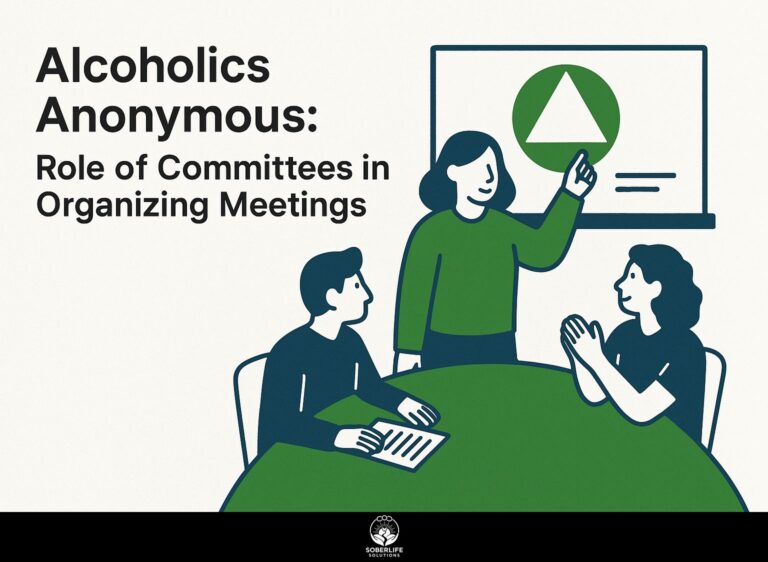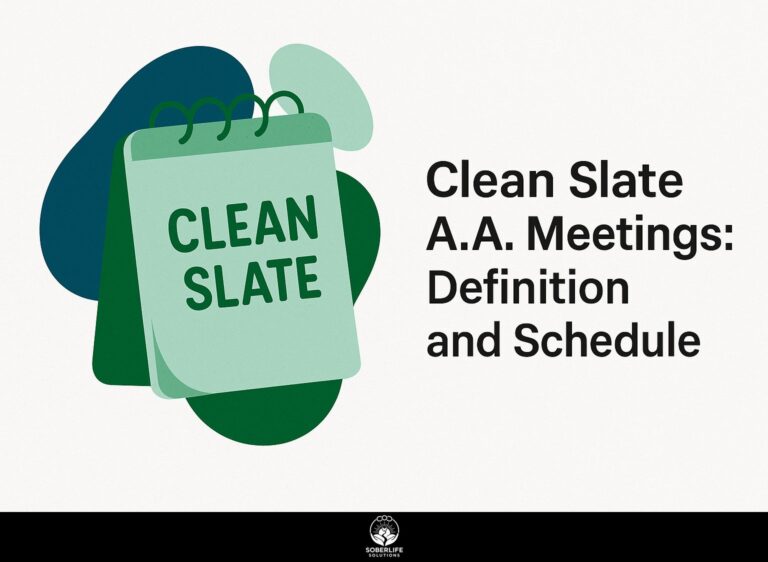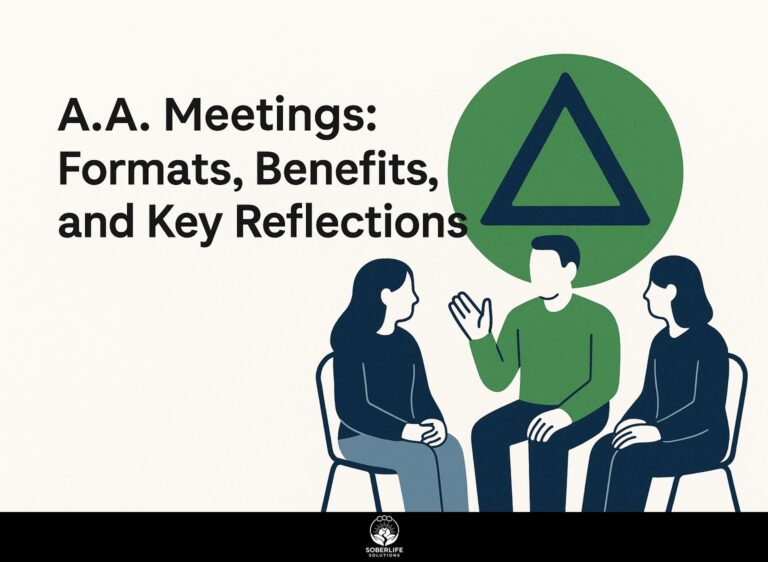Alcoholics Anonymous: Definition, Purpose, and Meeting Types
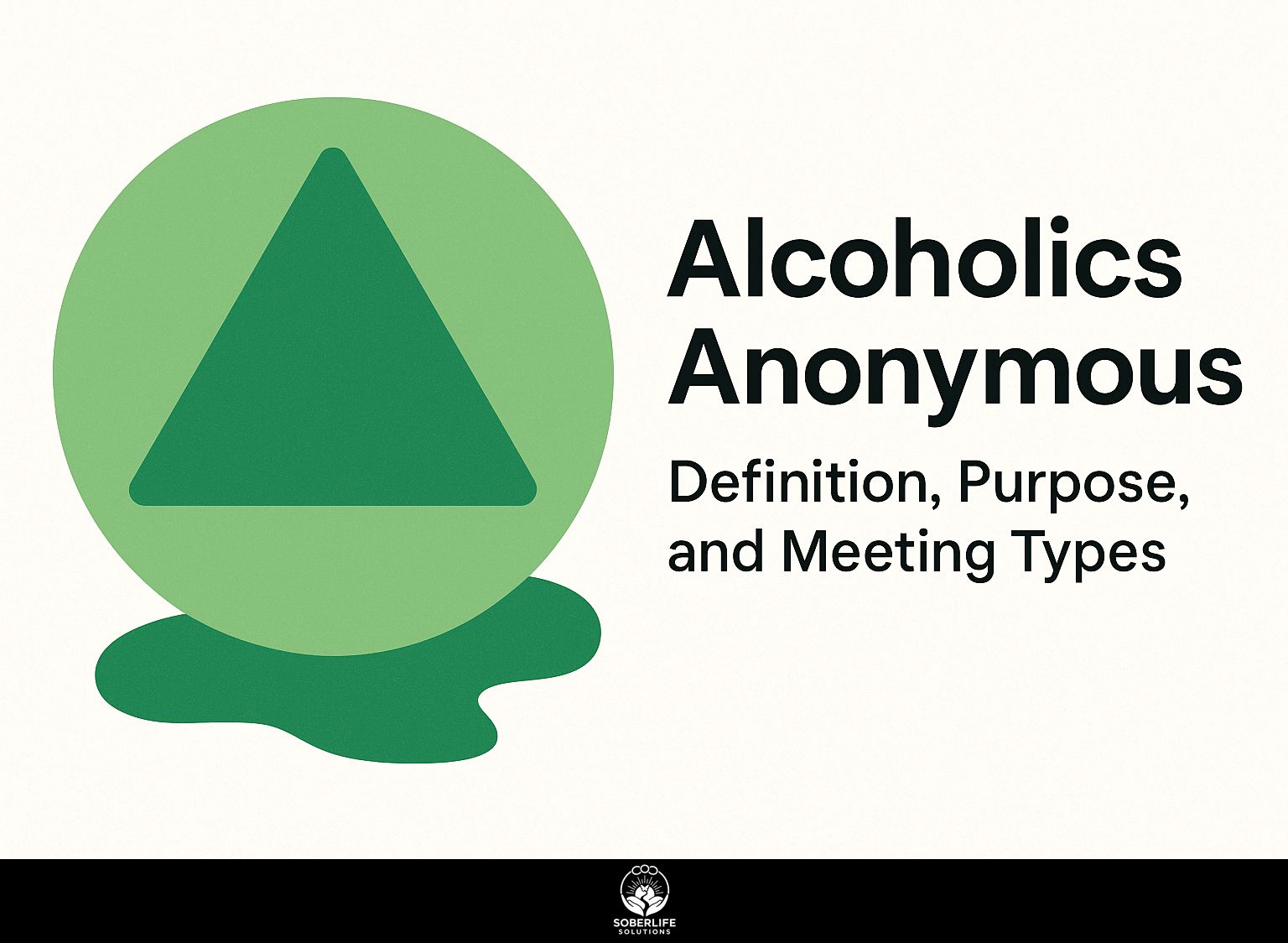
Feeling alone while dealing with alcohol problems is common, yet Alcoholics Anonymous (AA) offers a welcoming group for people looking to recover. Based on the life-changing 12 Steps, AA provides different kinds of meetings. These include open meetings that welcome both members and friends. In this article, we’ll explain what Alcoholics Anonymous is, its goals, and the various meeting types offered, helping you see how AA can be an important part of your path to staying sober.
Key Takeaways:
History of AA
Founded in 1935 by Bill Wilson and Dr. Bob Smith in Akron, Ohio, Alcoholics Anonymous has grown from a small group to a global fellowship.
AA’s history has important events like the release of the ‘Big Book’ in 1939, which shared personal experiences and recovery guidelines. This evolution is well-documented by Wikipedia, highlighting the significant milestones of the organization.
Over the following decades, the organization addressed community needs by setting up local branches in the 1940s to build local support.
By the 1960s, AA started using various recovery methods and outreach programs, spreading to other parts of the world.
Today, with millions of members worldwide, AA continues to expand and uses technology to hold meetings and offer support, making it simple for people to receive assistance. Worth exploring: How to Join Online AA Meetings? A Step-by-Step Guide for Newcomers.
Core Principles
The main focus of Alcoholics Anonymous is the 12 Steps, which help individuals recover by encouraging responsibility and spiritual development.
These steps guide individuals through a process of self-reflection and community support.
For instance, the first step encourages admitting powerlessness over alcohol, laying a foundation for honesty. The third step is deciding to let a higher power take control of your life, encouraging spiritual development.
Each step builds on the previous, creating a structured pathway toward recovery. People often find help in group meetings, which increase responsibility and offer a safe environment for sharing experiences. As mentioned, many newcomers find joining online AA meetings a helpful resource, and our guide for joining online AA meetings can provide a solid starting point.
This setup helps people grow and build stronger community connections, as described in the Twelve-step program article on Wikipedia.
Definition of Alcoholics Anonymous
Alcoholics Anonymous (AA) is an international group of people who talk about their personal stories and help each other stop drinking alcohol.
What is AA?
Known for its approachable structure, AA offers both open and closed meetings, allowing members to choose the level of privacy and participation they desire.
During these meetings, members usually discuss their experiences with addiction, often guided by the ‘Big Book,’ a core text that outlines the program’s principles and personal stories of recovery. The friendly environment promotes open communication and builds a feeling of mutual support.
In open meetings, non-members are welcome, expanding the group of people who understand the topics. Meanwhile, closed meetings provide a confidential space for individuals focusing solely on their recovery, reinforcing the importance of shared experiences in the healing process.
Membership Criteria
Anyone who has a desire to stop drinking can become a member of Alcoholics Anonymous, regardless of race, religion, or background.
AA membership is open to anyone who struggles with alcohol abuse and is committed to overcoming it. Members often find strength in shared experiences, receiving support through regular meetings and sponsor relationships.
To fully engage, newcomers are encouraged to attend meetings consistently, and participate in the 12-step program, which offers a structured path to recovery.
Books like ‘The Big Book’ are basic tools, helping members learn about their experiences and relate to others dealing with similar problems.
Purpose of Alcoholics Anonymous
The main goal of Alcoholics Anonymous is to support its members in stopping drinking and staying sober by sharing experiences and supporting each other.
Support and Recovery
AA offers a supportive environment where people can talk about their challenges and build emotional support through community recovery methods.
Through structured group discussions, members can openly discuss their experiences with substance abuse, which helps normalize their feelings.
Sponsors are important; they provide individual guidance and hold you responsible. A beginner might be matched with an experienced person who talks about their own experiences, helping them find a way to recover. Reddit discusses the nuances of AA sponsorship, elucidating what it truly entails.
These interactions often lead to the development of healthy coping strategies, such as mindfulness techniques or establishing daily routines, which reinforce sobriety and promote emotional resilience.
Spiritual Growth
Many members find that the spiritual side of AA, highlighted through the 12 Steps, supports them in their recovery, helping them grow personally.
Individuals interpret spirituality in various ways, from a connection to a higher power to a focus on personal values and community support.
For example, some find comfort in prayer or meditation, while others add mindfulness practices to their daily routine. Participating in service activities can help develop feelings of connection and meaning.
By learning about these spiritual practices, members often build inner strength, which is important for staying sober over time despite difficulties.
Adding these elements helps people think about themselves more and understand themselves better, which is very important for getting better.
Types of AA Meetings
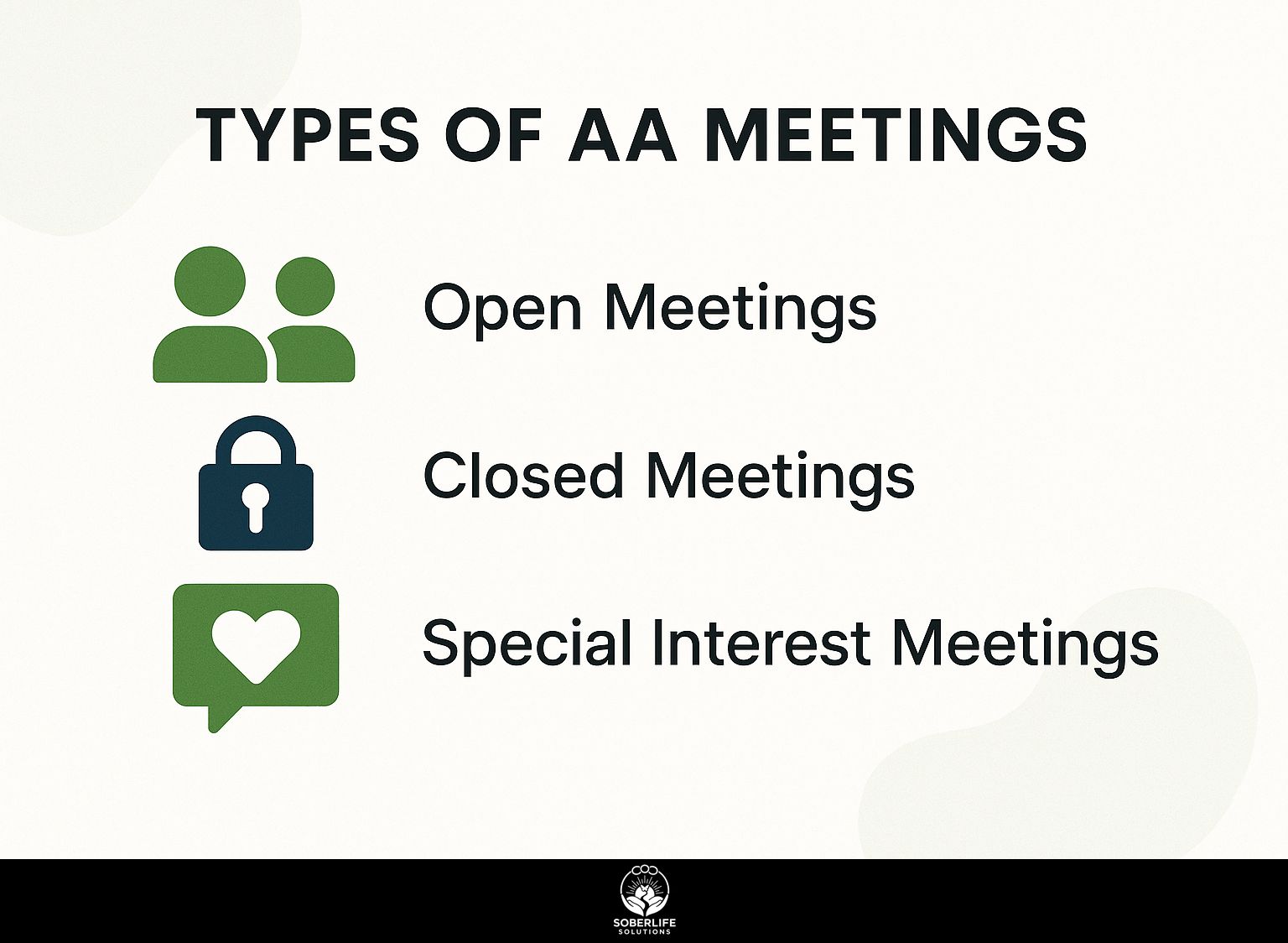
Alcoholics Anonymous provides various meetings to accommodate the diverse needs and preferences of its members, ensuring everyone feels welcomed and supported.
Open Meetings
Open meetings let anyone curious about AA come, helping the community know more and support people getting better.
These meetings are structured to create a welcoming atmosphere where participants can listen to personal experiences and ask questions. By encouraging community attendance, these gatherings help reduce the stigma around addiction, promoting empathy and support.
When local community members participate, they learn directly about the difficulties faced in recovery, helping build more supportive connections for those in recovery. Using tools like brochures or community hotlines can help reach more people, bring in more participants, and make sure everyone feels valued and heard.
Closed Meetings
Closed meetings are exclusively for individuals who identify as alcoholics, providing a confidential environment for deeper discussions on personal recovery.
In this supportive setting, members often share their struggles, victories, and strategies for sobriety.
Common topics might include ways to handle difficult situations, effective treatments, or personal experiences that connect with others. Privacy allows people to talk openly about their problems without worrying about being judged.
Many find it easier to discuss sensitive subjects, such as family conflicts or relapses, leading to mutually beneficial advice and encouragement. This transparency builds trust and reinforces the group’s connection, which is important for successful recovery.
Special Interest Meetings
Special interest meetings offer specific help to groups like LGBTQ individuals and families of people with alcohol problems.
These gatherings provide unique benefits by addressing the distinct challenges faced by these demographics.
LGBTQ meetings provide a secure environment where people can talk about their personal stories and difficulties, helping them feel connected.
Meanwhile, meetings for family members of alcoholics often focus on education about addiction, coping strategies, and emotional support. Resources like Al-Anon offer structured discussions and materials specifically designed for this audience.
Joining in allows people to meet others, pick up new skills, and strengthen friendships, which enhances well-being.
Frequently Asked Questions
What is Alcoholics Anonymous?
Alcoholics Anonymous (AA) is an international organization that provides support and guidance to individuals struggling with alcohol addiction. It is a fellowship of men and women who come together to share their experiences, strength, and hope in order to recover from alcoholism.
What is the purpose of Alcoholics Anonymous?
The main purpose of Alcoholics Anonymous is to help individuals achieve and maintain sobriety. This is achieved through a 12-step program that involves accepting a lack of control over alcohol, looking to a higher power for help, fixing past mistakes, and supporting others dealing with alcoholism.
What are the different types of meetings in Alcoholics Anonymous?
Alcoholics Anonymous has different kinds of meetings, such as open meetings, closed meetings, speaker meetings, discussion meetings, and step meetings. Open meetings welcome anyone interested in learning more about AA, while closed meetings are for members only. Speaker meetings feature a member sharing their personal story, while discussion meetings encourage members to share their experiences and receive support from others. Step meetings focus on one of the 12 steps of the program.
What can I expect at an Alcoholics Anonymous meeting?
At an AA meeting, you can expect a supportive and non-judgmental environment where members share their experiences, struggles, and successes related to alcohol addiction. Meetings typically begin with a reading from the Big Book (AA’s main text) and may include discussions, speakers, or group activities. You can also expect to have the opportunity to share your own story or thoughts, but it is not required.
Do I have to pay to attend Alcoholics Anonymous meetings?
No, there are no dues or fees to attend Alcoholics Anonymous meetings. The organization is self-supporting through voluntary contributions from its members. If you want to buy a copy of the Big Book or other AA materials, you might need to pay for it.
Is Alcoholics Anonymous a religious organization?
No, Alcoholics Anonymous is not affiliated with any religious group and does not promote any specific religious beliefs. The program highlights the need to find a higher power or spiritual link to support recovery. This greater force can be understood in any way that makes sense to each person.

